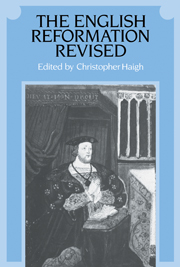Book contents
- Frontmatter
- Contents
- List of illustrations
- Acknowledgements
- Preface
- List of abbreviations
- Introduction
- 1 The recent historiography of the English Reformation
- 2 Church courts and the Reformation in the diocese of Chichester, 1500–58
- 3 Anticlericalism and the English Reformation
- 4 The Henrician Reformation and the parish clergy
- 5 Popular reactions to the Reformation during the years of uncertainty, 1530–70
- 6 The local impact of the Tudor Reformations
- 7 Revival and reform in Mary Tudor's Church: a question of money
- 8 Bonner and the Marian persecutions
- 9 The continuity of Catholicism in the English Reformation
- Conclusion
- Index
2 - Church courts and the Reformation in the diocese of Chichester, 1500–58
Published online by Cambridge University Press: 20 January 2010
- Frontmatter
- Contents
- List of illustrations
- Acknowledgements
- Preface
- List of abbreviations
- Introduction
- 1 The recent historiography of the English Reformation
- 2 Church courts and the Reformation in the diocese of Chichester, 1500–58
- 3 Anticlericalism and the English Reformation
- 4 The Henrician Reformation and the parish clergy
- 5 Popular reactions to the Reformation during the years of uncertainty, 1530–70
- 6 The local impact of the Tudor Reformations
- 7 Revival and reform in Mary Tudor's Church: a question of money
- 8 Bonner and the Marian persecutions
- 9 The continuity of Catholicism in the English Reformation
- Conclusion
- Index
Summary
It was largely through visitations and the regular sessions of his courts that a bishop sought to maintain the standards of the clergy and the religious life of his diocese, and to settle disputes over ecclesiastical matters. The state had also assigned to the Church the right of proving wills and of administering the goods of those who died intestate. Consequently, the spiritual welfare of a diocese depended to a large extent upon the efficiency and authority of its church courts, especially those of the bishop. It has long been known that these courts were left constitutionally untouched by the Reformation, and it has even been suggested that they actually had their jurisdiction strengthened by the legislation of the time of Henry VIII. It is the argument of this article, however, albeit on the basis of the evidence for one diocese, that the courts were undergoing reform in the last decades before the break with Rome, but that officially-inspired attacks upon them during the 1530s undermined their authority permanently.
In the diocese of Chichester, as in nearly every other diocese, the multiplicity and complexity of jurisdictions had come during the later Middle Ages to present a limitation upon the bishop's authority. In the city of Chichester, for example, archbishop, bishop and dean exercised ecclesiastical as well as temporal jurisdiction, while across the bishop's park, the diocesan of Exeter had jurisdiction over the royal college at Bosham. It is hardly surprising that most bishops of Chichester, like other diocesans whose authority in their cathedral cities was limited, chose normally to reside at one of their episcopal manors outside the city.
- Type
- Chapter
- Information
- The English Reformation Revised , pp. 34 - 55Publisher: Cambridge University PressPrint publication year: 1987
- 1
- Cited by



